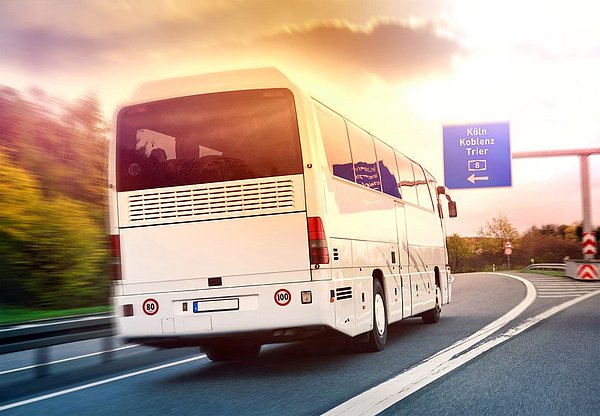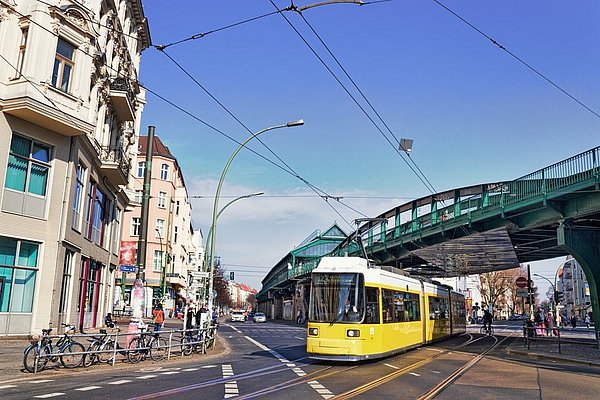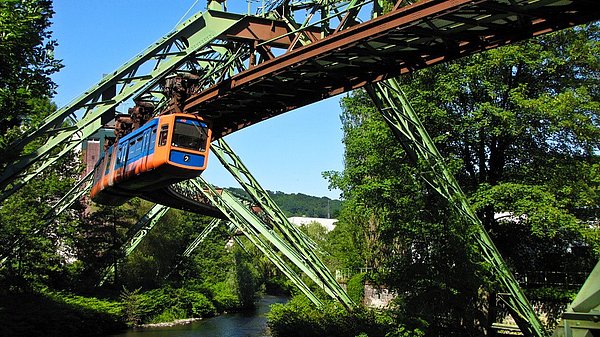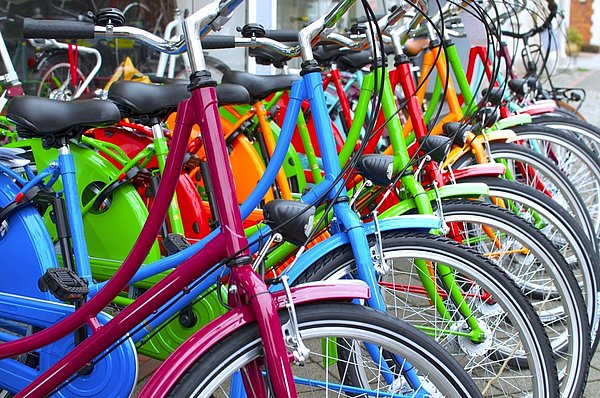Travel in Germany
Transportation
Germany has a very dense transportation network. There are many ways to travel throughout the country. If you don’t have your own car for the duration of your stay, the following transport options are offered:
Railway – Die Bahn

In case that you wish to travel further than from place to place in cities, for instance from city to city or even venture across the border and visit other countries, the Deutsche Bahn (www.bahn.de) would be appropriate. Inexpensive ‘Saver Fares’ are offered, if you book well in advance. Or you purchase a so called ‘BahnCard’ with which you are given automatic discounts on all tickets. You can calculate on their website whether it pays off for you to purchase a BahnCard. Sporadically, a trial BahnCard is available. In any case, you should check the discounts for students. In addition, there are group or weekend tickets available at low prices. The website of Deutsche Bahn (in short DB) is accessible in different languages (English, Spanish, and French etc).
Bus

Local busses are a good option to get around town. Relevant keywords to be entered into a search engine are the name of the ‘town’ and ‘bus’, this way you will easily find regional bus companies and their timetables and route maps.
Coaches
If you would like to travel from city to city, long-distance coach companies offering affordable prices have increasingly become established on the market in recent years. One coach company is, for example, FlixBus (flixbus.de). On their website, they offer, among others, trips from Munich to Prague starting from 15 Euros (about 400 km).
Deutsche Bahn also offers a long-distance coach service, the so called IC Bus, offering routes in Germany and abroad at favorable prices. https://www.bahn.de/p/view/angebot/fernbus/index.shtml
Suburban Railway (S-Bahn) and Underground Trains (U-Bahn)

Students in larger German cities often use public transportation to get around town, such as suburban railway lines (S-Bahn) or even underground trains (U-Bahn).
S-Bahn (Suburban Railway)
In many larger German cities there is a so called S-Bahn (suburban railway, tram) available to you. You will find railway connections, timetables and route maps by entering into the relevant search engine the search term ‘S-Bahn’ and the name of the city (e.g. Hamburg).
Usually, trains run at regular intervals within a very short time-span and until late at night. You must purchase tickets at ticket machines at the platform or tram stop. Among other cities, S-Bahn is available to you in Hamburg, Munich, Berlin, Dresden, Hannover, Stuttgart, Frankfurt, Magdeburg, and Rostock. If you are staying longer in the city, monthly tickets would be appropriate. Lower priced group tickets are available if you have someone visiting you.
U-Bahn (Underground/Subway)
Primarily the public transportation systems of German large cities such as Hamburg, Munich, Nuremberg and Berlin include underground trains (U-Bahn). U stands for underground or subway respectively. Timetables and route maps are online available. Just enter the name of the city and the search term ‘U-Bahn’ into the relevant search engine.
Suspension Railway (Schwebebahn)

A special mode of public transport can be explored in the city of Wuppertal. There is an overhead monorail called suspension railway (Schwebebahn). This landmark of Wuppertal has been in operation since 1901. These monorails glide at 10 metres of hight through the city, mostly above the narrow valley of the River “Wupper”. About 23 million people use it per year. If your stay in Germany leads you to Wuppertal, a ride in the ‘Schwebebahn’ is highly recommended. More information can be found here: https://www.schwebebahn.de/
Ride-sharing

Ride-sharing is a relatively economical way to travel. The idea is quite simple: private persons offer space in his or her car to other passengers who happen to go the same way. The driver offers the trip in an online portal, for example from Hamburg to Munich, providing the exact date and number of vacant seats. Reviews and short profiles of the registered drivers provide safety. You can find diverse online portals offering ride-sharing, for example: www.Blablacar.de. The company Comuto SA, seated in Paris, operates the international online ride-sharing marketplace under the brand BlaBlaCar. BlaBlaCar is active in 22 countries and has 12 offices worldwide. The German branches are located in Hamburg and Munich. Simply look for the ride you want and get registered.
Other providers are:
Fahrgemeinschaft.de
Drive2day.de by mitfahren.de
Bessermitfahren.de
The advantage of ride-sharing is quite obvious - the price. It is also a great way to meet interesting people. One disadvantage with ride-sharing, however, is that you have to align your schedule with the driver, and you might not get a ride-sharing to your exact destination.
Rental Cars

Of course, you can rent a car; however, costs are rather higher compared to other means of transport. Needless to say, the apparent benefit is that you can drive to your exact destination :-). Some rental car providers are for example:
www.billiger-mietwagen.de
mietwagen.check.24.de
CarSharing

CarSharing, which is already being offered in larger cities in Germany, represents a clear alternative to the rental car. The car can be booked via telephone, website or app with a various range of car types available. In most cases, there is more than only one pick-up location in the relevant cities, where the cars can be picked-up and dropped off. On registration as user you can start right off.
One provider is, for example, the company Cambio which has been operating in this segment for 25 years. https://www.cambio-carsharing.de/cms/carsharing/de/1/cms_f2_64/cms?cms_knschluessel=HOME&cms_f2=1&cms_f4=1
The Deutsche Bahn also has a CarSharing offer. In 300 cities and with 1,700 pick-up locations ‘Flinkster’ (www.flinkster.de) offers the largest network in Germany.
BikeSharing

A bicycle could be a very cheap alternative for you. Surely, you cannot travel such long distances as you do by train, but in good bodily fitness you can cycle some kilometers per day. Cycling is a very inexpensive alternative. Under https://www.upperbike.com/fahrrad-suchen.html you will find rental bikes starting from 4 € per day. Not only is cycling a good exercise but it also protects the environment and you don’t have to worry of getting stuck in traffic, because in most German cities there are specially marked paths for cyclists :-)
A ‘call a bike’ service is provided in larger cities. The Deutsche Bahn offers bikes for self-hire in more than 50 German cities. You can register online or via the Call a Bike app. Students discounts are granted here as well.
https://www.callabike-interaktiv.de/de/soeinfachgehts Prices currently stand at 15 € max. per day.
Another provider is ‘nextbike’ who offers bicycle rental systems in 45 German cities: https://www.nextbike.de



